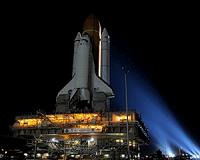 |
Moscow (AFP) April 11, 2011 The last living legends of the early years of human space flight in the Cold War met in a rare encounter on Monday to laud the achievement of Yuri Gagarin 50 years after his historic voyage into space. The gathering at the Cosmonautics Museum in the Russian capital to celebrate the anniversary of Gagarin's April 12, 1961, mission brought together luminaries including Alexei Leonov, the first man to walk in space and a colleague of Gagarin. Also present was Thomas Stafford, commander of the first joint space mission between the United States and the Soviet Union known as the Apollo-Soyuz Test Project; Valentina Tereshkova, the first woman in space; and China's first spaceman Yang Liwei. They heaped praise on Russia's space programme as they honoured the memory of the world's first human in space. "Without our spacecraft no one will go anywhere," Leonov proudly told reporters. Russia's Soyuz craft will later this year become the sole means for taking humans to the ISS when NASA takes its shuttles out of service, leaving the United States to rely on Russia. Leonov, 76, was among Russian and Soviet-era cosmonauts and pioneering space travellers from other countries as well as some 40 heads and representatives of foreign space agencies invited for the festivities. Squeezed into the small museum located in the obelisk topped with a rocket blasting into space, the veteran astronauts reminisced about past missions among artefacts of Soviet space history including bulky models of Soviet-era spaceships and the stuffed carcasses of dogs that travelled to space. The Kremlin is celebrating Gagarin's trailblazing flight with great fanfare, and many at Monday's celebrations spoke in glowing terms both about Russia's past achievements and future prospects despite a string of recent setbacks hitting its space programme. Tereshkova, a Soviet-era textile worker who became the first woman in space, gushed about Russia's next steps in space. "The moon, the lunar programme, Mars are ahead," the 74-year-old told AFP. "This is realistic." The Russian space programme has suffered dwindling funds in the post-Soviet era. The country still rents its main launchpad at Baikonur from Kazakhstan, but this year it begins construction of its own spaceport to be located in the Far East region of Amur near China. Prime Minister Vladimir Putin said earlier this month that after a lengthy break the country plans to return to interplanetary research. Some high-profile guests warned however that it was too easy to slip into complacency. "Many of our current achievements rely on the achievements of the past years," Russian cosmonaut Sergei Krikalev told reporters. "Maybe there's some sort of contentment. "As a professional working in this industry, I would of course want them to invest a bit more, develop a bit more, build a bit more," he said. Sending the first man into space -- the Soviet Union's greatest Cold War propaganda victory over the United States -- and launching the first Sputnik satellite four years earlier are among key triumphs of the Soviet space programme. But the country's modern space programme has been dogged by a series of setbacks and the head of the space agency, Anatoly Perminov, may be shown the door as soon as his foreign space guests return home. In December, the country suffered one of its most embarrassing space mishaps of recent years when three navigation satellites crashed into the ocean after launch, and the most recent launch for the ISS was delayed by a week due to a technical problem. The 80-year-old Stafford commended Russians for "persevering", noting that space rivalry was a thing of the past and urging close international cooperation. "I do not see a space race," he said. "I see cooperation. There's lots of plans, lots of ideas."
Share This Article With Planet Earth
Related Links Space Tourism, Space Transport and Space Exploration News
 Witnesses Say Future Of NASA Human Space Flight Is Uncertain
Witnesses Say Future Of NASA Human Space Flight Is UncertainWashington DC (SPX) Apr 01, 2011 today, in a hearing of the Subcommittee on Space and Aeronautics, witnesses expressed serious concern about the lack of clear focus by the Administration on NASA's transition from the Space Shuttle program toward development of the Space Launch System (SLS) and Multi Purpose Crew Vehicle (MPCV). These vital components of NASA's human space flight program were outlined as top priorities in the NA ... read more |
|
| The content herein, unless otherwise known to be public domain, are Copyright 1995-2010 - SpaceDaily. AFP and UPI Wire Stories are copyright Agence France-Presse and United Press International. ESA Portal Reports are copyright European Space Agency. All NASA sourced material is public domain. Additional copyrights may apply in whole or part to other bona fide parties. Advertising does not imply endorsement,agreement or approval of any opinions, statements or information provided by SpaceDaily on any Web page published or hosted by SpaceDaily. Privacy Statement |